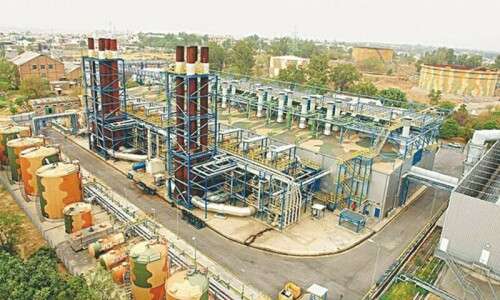
|
Getting your Trinity Audio player ready...
|
ISLAMABAD:
Pakistan is facing growing challenges in its petroleum supply chain as local oil refineries continue to operate below their optimal capacity, resulting in shortages of vital fuels such as JP-8 jet fuel at critical locations, including military and aviation facilities.
According to sources from the Oil and Gas Regulatory Authority (Ogra), a major defence body has raised concerns about the failure of domestic refineries to fulfill their promised deliveries of JP-8 aviation fuel. The authority has now urged refineries to meet their supply commitments promptly.
Despite repeated directives, none of the country’s six operational refineries have been able to meet their pledged volumes over the first nine months (July-March) of the ongoing fiscal year.
Defence Sector Seeks Guaranteed Jet Fuel Deliveries
The defence sector has explicitly requested Ogra’s intervention to ensure that local refineries adhere to their contractual obligations. However, refinery officials argue that preferential treatment given to certain oil marketing companies for importing refined fuels such as petrol and diesel has significantly undermined their operational capacity, forcing temporary shutdowns of some units.
Breakdown of Supply Commitments
Available figures indicate that Attock Refinery Limited (ARL), located in Rawalpindi, led the group by fulfilling around 85% of its pledged supply of JP-8. Parco came next with 70%, while Pakistan Refinery Limited delivered only 52% of its committed volume.
The other three refineries — National Refinery, Byco, and Enar — performed poorly, supplying just 25.5%, 25%, and 44% of their commitments respectively. Altogether, the combined deliveries from all six facilities reached only 58% of the total required supply for the July–March period.
ARL officials noted that their relatively better performance was still constrained by dwindling reserves in the northern oilfields, which supply its feedstock. The company has consistently requested a daily allocation of 5,000 barrels of crude from southern fields, currently being exported, but has received no response since 2022.
Multiple Setbacks Crippling Refineries
Compounding the situation are the frequent disruptions in local crude production. The ARL cited forced curtailments in gas supplies by the Sui Northern Gas Pipelines Limited (SNGPL) in favor of imported LNG as a major operational hurdle. Additionally, ongoing strikes and security issues in Khyber Pakhtunkhwa have led to erratic condensate supplies, further affecting operations.
Meanwhile, the unchecked smuggling of petroleum products continues to be a major challenge for the local refining industry. Refineries, including ARL, have expressed concern over falling production volumes and declining sales due to the availability of illegal and untaxed petroleum products in the market.
Imported Fuel Policy Under Fire
Parco has also informed the authorities that its diesel reserves have reached dangerously high levels, and its storage tanks are at full capacity. This has happened largely because oil marketing companies have been allowed to freely import refined petroleum, leading to reduced demand for locally refined fuel — ultimately disrupting jet fuel production.
FAQs for Pakistani Readers
1. Why are Pakistan’s oil refineries underperforming?
Due to a combination of low crude availability, frequent disruptions in local production, and policy preferences for imported fuels, refineries are unable to operate at full capacity.
2. Which refinery has supplied the most jet fuel to defence organisations?
Attock Refinery Limited (ARL) delivered about 85% of its committed JP-8 supplies, the highest among all refineries.
3. How is smuggling impacting local refineries?
Smuggled petroleum products are being sold at lower prices, undercutting local refineries and causing reduced demand for their output.
4. Why is there a surplus of diesel in storage facilities?
Oil marketing companies prefer importing refined diesel due to relaxed regulations, resulting in underutilization of local refinery output and storage overflow.
5. What is JP-8 and why is it important?
JP-8 is a type of jet fuel primarily used by military aircraft. Its availability is crucial for national defence and aviation readiness.






